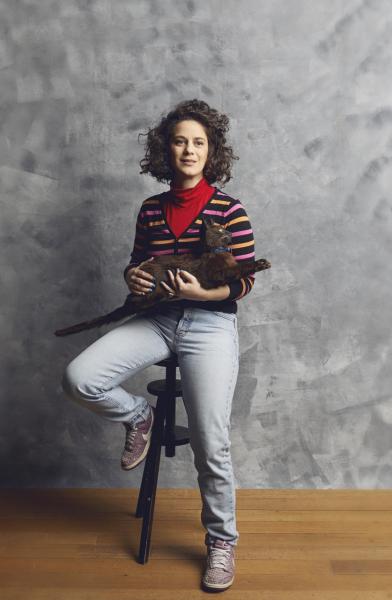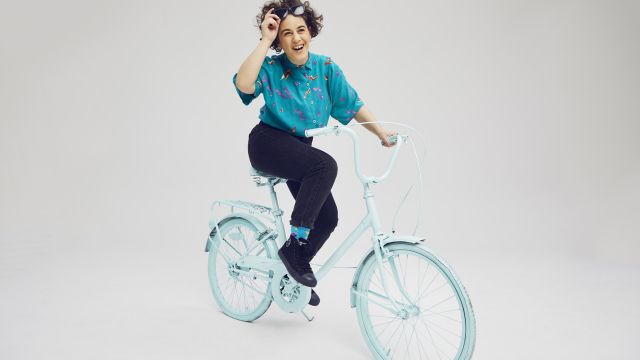Jude Perl’s Greatest Hits: So Fresh Spring 2020
Jude Perl has four Green Room Awards and a Best Cabaret Melbourne Fringe 2018 Award. Her songs are witty, intricate, clever, ironic, rather self-mocking and musically sophisticated (could that be a problem?) and she writes and sings them all herself. So, with this show, we might wonder why isn’t she a star? Why aren’t her ‘greatest hits’, actual hits? These are questions she asks too – and answers - in her very first song in this show, a song that also asks, ‘why can’t people respect me?’
She wanted to be a ‘female pop singer’ – that was her ambition. But she didn’t and doesn’t fit whatever it is a ‘female pop singer’ is supposed to be. One of the things a female pop singer is supposed to be is ‘sexy’ and Jude doesn’t think she is. Well, define ‘sexy’. Anyway, she’s something else – and in her second song she advises us - but mainly herself - ‘don’t worry about the future.’ As if… In fact, she was about to go on tour for all of 2020, until…
In this concert, ‘Live at [an empty] Hamer Hall’, Jude comes on stage in a sort of cloak made up of many plastic breasts – a wardrobe reference to ‘sexy’ – I think – but she peels that off and dumps it, replacing it with a sort of mannish sports coat for the rest of the show. The show is just her, a grand piano and some glitzy Las Vegas lighting changes between her ‘greatest hits’ – those songs that aren’t hits. They are some of the songs she considers her best, or that have resonated with audiences in her five previous shows – but they’re a kind of autobiography too. She segues charmingly from one song to the next, linking an underlying narrative about Jude herself: her disappointed ambitions (okay, unrealistic anyway), being poor, being sad, being lonely, being depressed – but rejecting labels – about love going wrong, about gastric problems (yes – it’s bread), about not having kids (despite what Jewish relatives say), about being just simply absurd (naked and covered in honey) for the fun of it. There’s a satiric, self-lacerating song too, ‘I’m a good person, I do good things…’

There’s a great song from her show Roommates here, in which Jude counters criticism of share house living by asserting, ‘it’s not sad, it’s practical’, the singer plainly not convincing her mother or herself. She tells us the song is a metaphor: the different roommates are the different conflicting personalities that make up one person: the cheerful optimist, the perpetual sour critic and the jus’ getting’ by. It’s that whistling-in-the-dark, keeping depression at bay with irony and humour that is a thread through all the songs. ‘Depression’ explicitly is not a term – or a label – Jude likes. Could we say, ‘forever sad’ instead?’ she asks in a ‘power ballad’. How about ‘durable loneliness’? What does it mean to be ‘in love’? And segueing into another song about a guy called Hamish and all the things she could have said, but didn’t, until it was totally the wrong things to say…
When Jude is not playing or singing, you can hear just how empty Hamer Hall is – and when she confides in the audience it’s the only the camera – and she knows her audience, were they there, is complaining about what she didn’t sing. She cajoles the ‘audience’ into joining her in a three-part harmony – ‘Hey, hi, hello’ – because that’s just what she’d do if there were an audience. The effect is obliquely very sad, reminding us of the lack of contact and engagement with live performance during the lockdown. And at the end, she accepts the ‘audience’s applause’ and curtseys and shrugs modestly and allows the ‘audience’ to persuade her to give them an encore… Just one more – please? So, back to the piano and just one more.
This last song is just as clever, just as witty, but it’s about mental health, and it’s no soft plea for sympathy. It’s about well-meaning but uncomprehending ‘advice’ from the well-meaning but uncomprehending. Jude’s had some problems but in this show we see how she fights back and fights on, and one of her weapons is humour wrapped up in a kind of defiant -and very entertaining – self-aware irony. Jude: she’s not a star, her greatest hits are not hits but she is brilliant.
Michael Brindley
Subscribe to our E-Newsletter, buy our latest print edition or find a Performing Arts book at Book Nook.

